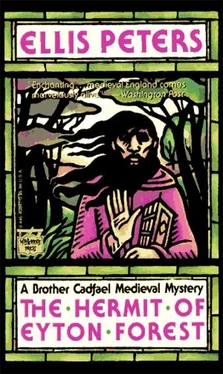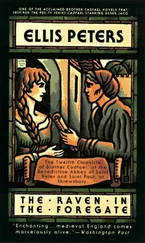The thick woodland hid the hermitage from them until they were very near. The sudden parting of the trees before them came always as a mild surprise, unveiling in an instant the small green clearing, the low pales that made a mere token fence about the garden, and the squat cell of grey stone, patched with the newer and paler grey of its recent repairs. The door of the house was open, as Cuthred had said it always was, to all who came. There was no one at work in the half-cleared garden, no sound from the interior of the cell, as they dismounted at the gateless gateway and tethered their horses. Cuthred must be within, by the silence perhaps at his prayers.
“Go first, Father,” said Hugh. “This is more within your writ than mine.” The abbot had to stoop his head to pass through the stone doorway, and stood motionless for a moment within, until his eyes grew accustomed to the dimness. The single narrow window let in a subdued light at this hour by reason of the overhanging trees, and the shapes within the bare room took on substance only gradually, the narrow pallet against the wall, the small table and bench, the few vessels, plate and cup and pottery bowl. The doorless opening into the chapel revealed the stone block of the altar by the tiny glow of the lamp on it, but left all below in obscurity. The lamp had burned very low, was no more than a spark.
“Cuthred!” called Radulfus into the silence. “Are you within? The abbot of Shrewsbury greets you in the name and grace of God!” There was no answer but the small, stony echo. Hugh stepped past and advanced into the chapel doorway, and there halted abruptly, drawing in hissing breath. Cuthred was indeed within, but not at his prayers. He lay sprawled on his back beneath the altar, head and shoulders propped against the stone, as though he had fallen or been hurled backwards while facing the doorway. His habit billowed in dark folds round him, exposing sinewy feet and ankles, and the breast of the gown was matted and blackened by a long stain, where he had bled from the stab that killed him. His face, between the tangled dark fell of hair and beard, was contorted in a grimace which might have been of agony or of rage, the lips drawn back from strong teeth, the eyes glaring half-open. His arms were flung wide, and beside his right hand, as though released in the moment of falling, a long dagger lay spilled on the stone floor.
Priest or no, Cuthred was never going to testify in his own defence. There was no need to question or touch to see that he was some hours dead, and dead by violence.
“Christ aid!” said the abbot in a harsh whisper, and stood like stone over the body. “God have mercy on a murdered man! Who can have done this thing?” Hugh was on his knees beside the dead man, touching flesh already grown chill and waxen in texture. There was nothing to be demanded now of the hermit Cuthred, and nothing to be done for him in this world, short of the final balance of justice.
“Dead some hours at least. A second man struck down within my shire, and no requital yet for the first! For God’s sake, what is it let loose in these woods to such devilish effect?”
“Can this possibly have any bearing,” wondered the abbot heavily, “on what the boy has told us? Has someone struck first to prevent him ever answering in his own defence? To bury the proof with the man? There has been such resolute plotting over this marriage, all for greed of land, but surely it could not be carried so far as murder?”
“If this is murder,” said Brother Cadfael, rather to himself than to any other, but aloud. He had remained still and silent in the doorway all this time, looking round him intently at the room he remembered well from a single visit, a room so sparsely furnished that every detail was memorable. The chapel was larger than the living room of the cell, there was room here for free movement, even for a struggle. Only the eastern wall was built up beneath its tiny square window with the great fashioned stone of the altar, and atop that the small carved reliquary on which stood the silver cross, and on either side a silver candlestick holding a tall candle, unlighted. On the stone before the reliquary, the lamp, and laid neatly in front of it—But there was nothing laid in front of it. Strange to have the man thrown down in disordered and disregarded death, but the altar so trim and undisturbed. And only one thing missing from the picture Cadfael carried in his mind’s eye. The breviary in the leather binding fit for a prince, tooled in intricate scrolls and leaves and gilded ornament, was gone.
Hugh rose from his knees and stood back to view the room as Cadfael was viewing it. They had seen it together, by rights their memories should match. He shot a sharp glance at Cadfael. “You see cause to doubt it?”
“I see that he was armed.”
Hugh was already looking down at the long dagger that lay so close to Cuthred’s half-open hand. He had not touched it. He stood back and touched nothing, now that he knew the discarded flesh before him was cold. “He loosed his hold as he fell. That dagger is his. It was used. There is blood on it—not his blood. Whatever happened here, it was no furtive stabbing in the back.”
That was certain. The wound was over his heart, the stiffening patch of blood from it had reached his middle. The dagger that killed this man had been withdrawn and let out his lifeblood. Its fellow here on the floor was stained for only a thumb’s length from its tip, and had barely shed one drop upon the stone where it lay.
“You are saying,” said the abbot, stirring out of his horrified stillness, “that this was a fight? But how should a holy hermit keep sword or dagger about him? Even for his own defence against thieves and vagabonds such a man should not resort to arms, but put his trust in God.”
“And if this was a thief,” said Cadfael, “he was a most strange one. Here are cross and candlesticks of silver, and they are not taken, not even shaken from their places in the struggle. Or else they were set right afterwards.”
“That is truth,” said the abbot, and shook his head over so inexplicable a mystery. “This was not done for robbery. But what, then? Why should any man attack a solitary religious, one without possessions by choice, one whose only valuables are the furnishings of his altar? He has lived unmolested and serviceable among us, by all accounts open and accessible to all who came with their needs and troubles. Why should anyone wish to harm him? Can this be the same hand that killed the lord of Bosiet, Hugh? Or must we fear we have two murderers loose among us?”
“There is still this lad of his,” said Hugh, frowning over the thought but unable quite to discard it. “We have not found him, and I had begun to think that he had made off westward and got clean away into Wales. But it’s still possible that he has remained close here. There may well be those who are sheltering him and believe in him. We have grounds for thinking so. If he is indeed the villein who ran from Bosiet, he had some cause to rid himself of his master. And say that Cuthred, who disowned him on hearing he had been deceived in him, found out his hiding place now—yes, then he might also have cause to kill Cuthred. All of which is mere matter for conjecture. And yet cannot be quite rejected.”
No, thought Cadfael, not until Aymer Bosiet has gone his way back to Northamptonshire, and Hyacinth can come out of hiding and speak for himself, and Eilmund and Annet, yes, and Richard, can speak for him. For between the three of them I’m sure it can be proved exactly where Hyacinth has been at all times, and he has not been here. No, we need not trouble about Hyacinth. But I wish, he thought regretfully, I wish they had let me confide in Hugh long ago.
The sun was higher in the sky by now, and found a better angle through the leafage of the trees, to shed more light upon the distorted and lamentable body. The skirts of the rusty black habit were gathered together at one side, as if a large fist had drawn them into its grasp, and there the woollen cloth was clotted with a sticky dark stain. Cadfael kneeled and drew the folds apart, and they separated with a faint, rustling reluctance. “Here he wiped his dagger,” said Cadfael, “before sheathing it again.”
Читать дальше












